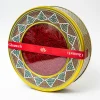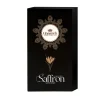If people for a relatively long period of time are no longer energetic and willing to do routine tasks like in the past, they need to consult a psychiatrist. In today’s fast-paced and stressful world, sometimes we all may lose our interest in the daily activities we used to do at home or at work for a short period of time, or we may feel sad, but if this disinterest and sadness continue more than two weeks, possibly we face a mental illness: depression. Various studies confirm the positive curative effect of saffron supplementation on symptoms of mild-to-moderate depression with fewer adverse events compared to conventional antidepressant medication.
Against a growing problem
Depression as a mental disorder (also called major depression, major depressive disorder, or clinical depression) is classified as a mood disorder.Around 5% of the world’s population is diagnosed with depression. Researchers believe that actual figures are higher ( around 20%) as today, there are many reports on mood disorder cases.
Incompatibility between past human surroundings and modern-day living paves the way for the growing chronic diseases that, in turn, may be fundamental to ascending rates of depression. On the other hand, a declining social trust and widening gaps of inequality plus loneliness in our crowded cities are underpinnings of a depressiogenic social context. A glance at modern populations reveals that most of them are overfed, malnourished, sedentary, sunlight-deficient, sleep-deprived, and socially isolated. These modifications in lifestyle each contribute to various physical disorders and affect the occurance and therapy of depression.
Antidepressant medication, psychotherapy, or both are proposed to be implemented to deal with depression. Electroconvulsive therapy and somatic treatments are also used to address this rampant disorder. Does traditional medicine suggest any drugs to treat depression? The eye-catching efficacy of saffron in harnessing depression is mentioned in traditional medicine resources.
Symptoms of depression
Feeling sad, losing interest in daily activities, alteration in appetite (increase or decrease in appetite), change in sleep hours, increasing fatigue, feeling worthless or guilt, lack of concentration or decision-making, and in acute situations, the desire to die or commit suicide are signs that can be considered as symptoms of depression, especially if these feelings exist in you for a long time.
If people for a relatively long period of time are no longer energetic and willing to do routine tasks like in the past, they need to consult a psychiatrist. In today’s fast-paced and stressful world, sometimes we all may lose our interest in the daily activities we used to do at home or at work for a short period of time, or we may feel sad, but if this disinterest and sadness continue more than 2 weeks, possibly we face a mental illness: depression.
Due to its severity and weakness, depression can also lead to physical diseases like thyroid problems, brain tumors, and vitamin deficiency. So, if you have such troubles continuously, they could be counted as symptoms of depression.
Seasonal depression
One of the most common types of depression is seasonal depressive disorder, which starts at the beginning of the season and is the most common in winter. Lack of natural light affects the part of the brain that is responsible for sleep and appetite, mood, libido, and activity level.
As the days get shorter and as a result, the colder and the humidity increases, a large number of people feel depressed. These people feel that they have less energy.
According to the BBC, about two million people in the UK suffer from seasonal depression disorder, which is also known as “winter depression” due to its exacerbation in the cold season. In this way, for example, if it is October and you feel anxious, you cry all the time and eat too much, and you don’t want to socialize with others and like to stay in your bed and don’t go out, you are probably dealing with this type of depression.
less adverse effects of plant extracts
Depressive disorder is one of the most prevalent psychiatric diseases and Murray and Lopez estimated that more than 21% of the world’s population are suffering from it.
Side effects of taking synthetic antidepressant drugs such as the inability to drive a car, dry mouth, constipation, and libido make the majority of patients reluctant to take these drugs in their appropriate way. That is why most sufferers prefer plant extracts, and it is proved that these attractive sources of drugs produce a better result with much lower side effects in the treatment of depression. For example, people who take fluoxetine as a conventional antidepressant experience side effects like losing their appetite, weight loss (which could be a severe problem for thin people), nervousness, anxiety, restlessness, poor concentration, and feeling tense. Another complaint is sexual dysfunction (including difficulty maintaining an erection).
Taking imipramine as another common antidepressant may lead to a wide range of side effects like nausea, drowsiness, weakness or tiredness, excitement or anxiety, nightmares, dry mouth, and skin more sensitive to sunlight than usual. Also, changes in appetite or weight, constipation, difficulty in urinating or frequent urination, changes in sex drive or ability, and finally, excessive sweating are reported by patients who took the drug.
In some people, the drug can even have more severe side effects such as spasms in jaw, neck, and back muscles, slow or difficult speech, shuffling walk, uncontrollable shaking of a part of the body, fever, sore throat, or other signs of infection, difficulty in breathing or swallowing, severe rash, yellowing of the skin or eyes, and irregular heartbeat.
Rare compounds in saffron
The red stigmata of this spice contain different rare bioactive compounds including, safranal, crocin, campherol, picrocrocin, crocetin, α- and β-carotenes. These picrocrocin and crocin only isfound in saffron and gardenia.
This rareness and the majical effect of such compounds make saffron the subject of a large number of research papers focusing on potential saffraon role in controlling or treating cancer, degenerative eye deseases, and neurodegenerative disorders. Studies have confirmed the antioxidant and anti-inflammatory role of ethanol or aqueous extracts of saffron, safranal, and crocin. Another study reported a reduction of blood bilirubin level and decreased blood cholesterol, and triglycerides were found after using crocetin and crocin. Since one of the things agreed upon by scientists about saffron is its efficacy on the treatment of depression, and a lot of research has been done on this matter, we will examine depression below.
Benefits of saffron for depressive disorder
As saffron threads are rich in four crocin, crocetin, picrocrocin, and safranal they are traditionally used in Western (particularly Persian) medicine to treat a range of physical illnesses including menstrual disorders, inflammation, and depressive symptoms (mild-to-moderate depression)
Different pilot double-blind randomized trial proved that saffron effect on depressive symptoms resembles the antidepressant effects of Fluoxetine, and Imipramine, at a dose of 30 mg/day for at least 6 weeks in participants with depression.
Anther double-blind, randomized and placebo-controlled trial revealed that healthy female humans exposed to saffron aroma for 20 min also experienced a decrease in salivary cortisol levels, which was consequently accompanied by a decrease in anxiety disorders.
A double-blind, placebo-controlled study shows that saffron aqueous extract and its main constituent, crocin, on health-related quality of life, depression, and sexual desire in coronary artery disease patients.
One study in 2018 had 80 participants aged 12 – 16 years with anxiety and depression and concluded that Saffron extract was effective in relieving the symptoms of separation anxiety, social phobia, and depression compared to placebo.
How much do we need to take saffron?
Different clinical studies and systematic reviews show that saffron is possibly safe if it is prescribed as a drug in doses of up to 100 mg daily for 26 weeks or even more. Drowsiness, stomachache, headache, nausea (vomiting and in some rare cases allergic reactions are reported as adverse effects by some patients.
Consumers who take doses of 5 grams or more take the risk of being poisoned and need to be taken to the hospital urgently. Doses of 12-20 grams can cause a very
400 mg daily of taking saffron for 7 days cause not clinically important, increases in serum creatine, sodium, and serum urea nitrogen. Also, using 20 mg of crocin as an active saffron constituent by healthy volunteers produced minor hematological changes but adverse events have not been witnessed.
Avoid eating saffron if…
Mothers who breastfeed have been advised to not go beyond using saffron in amounts greater than those found in culinary.
Saffron usage might flare up excitability and impulsive actions in those who suffer from bipolar disorder.
As saffron can cause a slowdown in the central nervous system, you have to stop taking saffron at least two weeks before a scheduled operation. People who are allergic to Lolium, Olea (including olive), and Salsula plants may also be allergic to saffron and should consult an allergy specialist before consuming it.
Saffron’s mechanisms of action on the brain
Rats cases
Rats, too, have played a role in providing us with scientific evidence about the antidepressant mechanisms of saffron. Aqueous extract of saffron increases brain dopamine and glutamate concentrations in rats. Saffron aqueous extract and its constituent crocin reduce stress-induced anorexia in mice.
The antidepressant effect of Crocus sativus aqueous extract and its positive effect on increasing some protein levels in rat hippocampus is also proven.
In human brain
Preclinical studies has demonstrated an anxiolytic effect of saffron in patients with mild to moderate depression.
By comparing the effects of saffron to other pharmacological treatments of depression, we can say that it may act on similar neurotransmitter systems, although we need deeper studies to discover the exact mechanisms of action of saffron components on the human brain.
In fact, saffron enhance brain function, in particular, in two distinctive way: As brain-derived neurotrophic factor (BDNF), Nerve Growth Factor cAMP, and Response Binding protein (CREB) are important players in controlling anxiety and depression, saffron has a notable effect on those factors and protein levels in the brain.
Researchers at Murdoch University conducted a systematic analysis of every clinical trial they could find for high-quality, randomized, double-blind studies using Saffron and concluded that clinical trials support the use of Saffron for the treatment of mild to moderate depression.
By spurring the release of anandamide and arachidonoylglycerol which are also released after using marijuana in our body, saffron reduces depressive symptoms without any negative adverse effects of marijuana.
Substances and Sleep
Sleep often gets worse with age
With its restorative powers and ability to boost the immune system, sleep is a critical component of our overall health. While the recommended amount of sleep for adults is between seven and nine hours per night, 25.5% of women and 22.6% of men 65 and older sleep less than seven hours per night. It’s important to consider the substances we expose ourselves to daily, as many of these can negatively impact our sleep.
Adjusting your diet for better sleep
Foods high in tryptophan, melatonin, and serotonin can make you sleepy. Some over-the-counter supplements with these ingredients are marketed as sleep aids. Choosing foods that promote better sleep and avoiding those that impair sleep can help you meet your rest goals.
Here are some diet tips for better sleep:
- Avoid eating foods high in sugar late in the day.
- Drink saffron tea during the day.
- Stop your caffeine intake at least six hours before going to bed. Some people may need to stop around noon if they experience the effects of caffeine for longer periods.
- Choose snacks that are high in melatonin, like walnuts or kiwis.
- Drink chamomile tea before bed. Antioxidants in this tea can help promote sleepiness.
- Dairy products, like milk, contain tryptophan, which can help you sleep better.
The result of the most comprehensive meta-analysis
The most comprehensive meta-analysis assessed the effects of saffron supplementation on depressive and anxiety symptoms( released in Nutrition Review, 2019) providing us with a deeper knowledge of the possible efficacy of saffron to cure mental disorders.
The results of this meta-analysis are consistent with 2 previous meta-analyses examining saffron for mild-to-major depression. In fact, the meta-analysis of 2019 is a review of 23 double-blind, controlled clinical trials proving that saffron had a large positive effect size over placebo for depressive symptoms and anxiety symptoms. So it is another confirmation of saffron positive effect on the improvement of sufferers from mild-to-major depressive disorder with anxious distress.
According to the 2019 meta-analysis saffron also had a significant could be effectively used as an adjunctive treatment to antidepressant medication.
Conclusion
People can safely consume up to 1.5 grams of saffron as a daily dietary supplement. They need to avoid crossing this red line as it could be seriously harmful and have toxic effects. Different clinical trials clarify that saffron could be employed as an option for patients with unipolar mild-to-moderate depression who are resistant to conventional antidepressants. The current studies confirm that the adverse events of conventional medications have not been witnessed in using saffron.
FAQ
Is saffron able to treat depression?
The results of different systematic review and meta-analysis studies clarify that active constituents of saffron supplements can have a healing effect on depressive symptoms like conventional antidepressants, to cure cases with mild-to-moderate depression.
Who should avoid taking saffron?
People with bipolar disorder, Moms who breastfeed their babies, and those who are waiting for a scheduled operation in two weeks need to stop eating saffron.
When do we need saffron?
The short, dark days of winter can be grounds for depressive symptoms. If you feel that you have lost the ability to do your daily tasks for more than 2 weeks and feelings such as sadness and worthlessness do not leave you, think about saffron.













Pingback: Appetite Suppressant Effects of Saffron: Anti-Obesity Drug